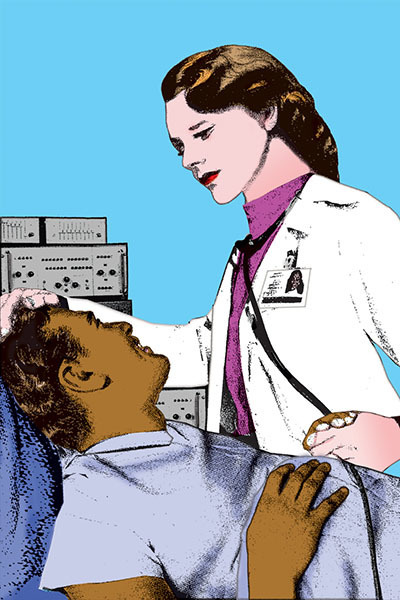
I remember watching an episode of Scrubs one time where the young doctors were racing against the clock on a Friday afternoon to find answers for a patient before the inevitable slowdown of the weekend struck. Before I worked in a hospital, I assumed this was an exaggeration. When I graduated from residency this past summer, though, I could attest: It’s definitely not an exaggeration. You should do your very best to have medical emergencies on Monday mornings, whenever possible.
 illustration: Pierre-Paul Pariseau
illustration: Pierre-Paul Pariseau
On one Friday afternoon during my time as a family medicine resident on the west side of Chicago, I was myself trying to find answers for a patient before the inevitable slowdown of the weekend struck. My patient was a homeless, older, African-American man with prostate cancer and HIV and — now — a broken hip. His X-rays required no medical training to read and lament. He needed surgery, a difficult operation that would require equipment our community hospital would need to beg and borrow from other places.
I spoke to one of the few orthopedic surgeons on staff at our hospital — a fellow Notre Dame graduate — about the case. We agreed that if the surgery were to be done on the timeline the patient required, transferring him to one of the surrounding tertiary care centers was the best option.
The Friday afternoon wore on as I sat on hold with various nearby care centers. Polite transfer nurses listened to my plight. “Oh, dear. Cancer? HIV? And he’s homeless?” There was no lack of sympathy for the patient. No lack of understanding regarding the need to fix his broken hip sooner rather than later to prevent blood clots, complications, total debility. There were just no beds. Or so I was told.
Finally, I reached a nurse at a large university center who threw up a Hail Mary and let me talk to the senior orthopedic surgery resident. By this time, I was bracing for failure. I recalled the more common surgeon stereotypes — the not-so-flattering ones — and prepared to be told “not my problem” by a frat boy named Brice who was headed to the gym before his big weekend of watching sports and crushing beer cans against his head. (Not my proudest moment.)
When the orthopedic surgery resident got on the line, I quickly realized he would debunk my Brice stereotype in a big way. Hearing his thick Jersey accent on the other end, I also realized I was talking to a fellow transplant. He listened to the patient’s history and hospital course. He sympathized. He acknowledged the reality that if this patient did not get his surgery in a timely way, serious complications and compromises to the quality of his remaining life would result.
Read more here.
Originally published by at magazine.nd.edu on October 02, 2017.